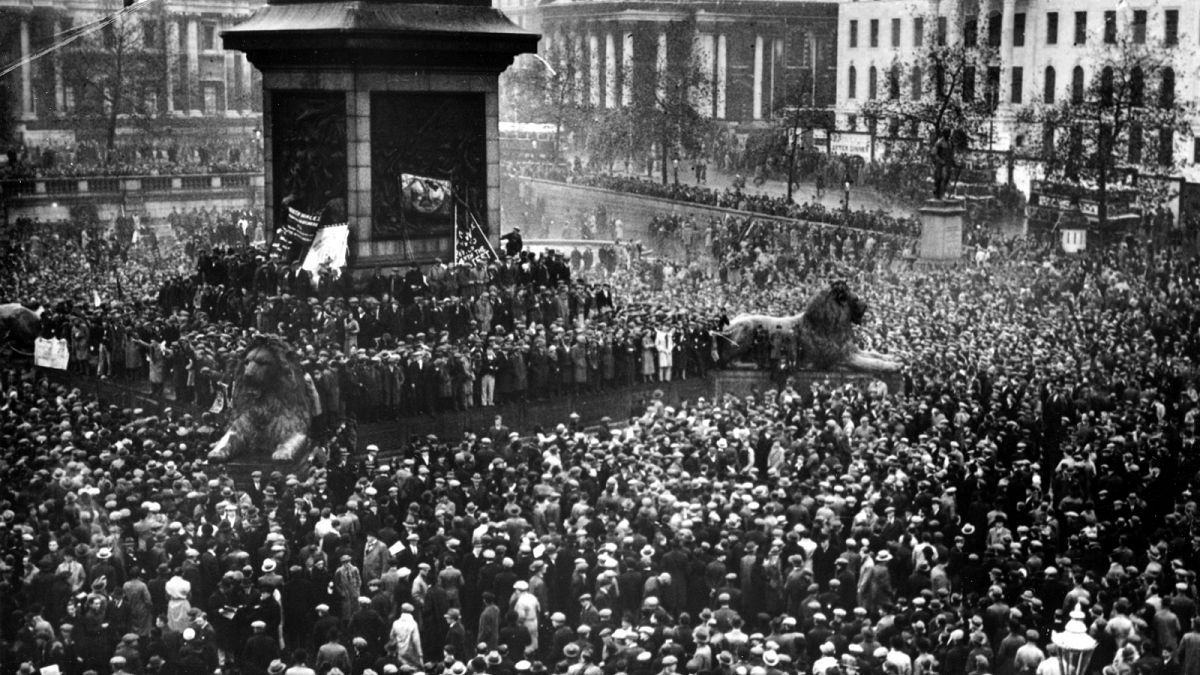The experience of Britain in the 1920s and early 1930s provide valuable lessons for the European Union in forging a meaningful economic response to this virus crisis.
What a difference a hundred years makes. Or perhaps, not so much of a difference at all. Because as Europe, and the world, grapples with combined health, economic and social crises, politicians are beginning to fret about future growth rates, exploding public debt levels and the spectre of mass unemployment.
The focus may still rest on combatting the terrible human tragedy of this coronavirus outbreak, but deep down the lingering worries about the longer term economic cost are growing.
This, many economists argue, really is a time unlike any other. But that is not entirely true.
Because the experience of Britain in the 1920s and early 1930s provide valuable lessons for the European Union in forging a meaningful economic response to this virus crisis. These British experiences - part political myopia, part economic catastrophe - can help protect Europe from yet another decade of low growth and soaring unemployment.
In 1920, Britain was facing a world in which all of the old certainties had quickly deserted her. Although victorious in the Great War, it had left Britain economically weaker in every respect (and a significant debtor to the United States). The British national debt spiralled from 25% in 1913 to over 125% by 1920. The British recession of 1921-22 resulted in the largest drop in British employment levels since the Napoleonic Wars.
Economically, the 1920s for Britain were all about grasping at the return of pre-1914 norms. The result was over a decade of fiscal orthodoxy which resulted in a grinding, punishing austerity path. This obsession with returning to the pre-war Gold Standard exchange rate of $4.86 (finally achieved in 1925) left in its wake a lethal mix of political turmoil and economic hardship.
Events deemed impossible before 1914 now occurred without hesitation: the first left wing Labour Party government of 1924 being surpassed by the 1926 General Strike. These were grim times with unemployment averaging 14% during the inter-war years.
Financial rigidity bred a creaking social order. The cost of this fiscal orthodoxy was, as caustically noted by the Bank of England, “a painful one to some classes of the community,” but completely “unavoidable.”
By the time of the stock market crash in 1929 and the ensuing Great Depression, Britain was a busted flush. Unemployment more than doubled as world trade and investment collapsed. Yet, the British response remained impeccably orthodox. More fiscal consolidation, more borrowing from the United States and a national government to soothe the increasingly angry public mood.
By 1931, it was simply unsustainable. Britain left the confines of the Gold Standard. The world did not end, rather interest rates reduced (from 6% to 2% making exports more competitive), construction restarted, and economic growth returned.
For the half-finished Eurozone, these British experiences should serve as a stark reminder. A warning as to the perils of seeking to impose pre-crisis norms on post-crisis economies changed beyond recognition.
For Britain in 1930, now read the Eurozone in 2020.
Because the euro, like the Gold Standard, is held together by political will, not some pellucid economics. Long simmering frustrations – now openly conducted – between northern and southern Eurozone members reflects a decade-long war about using fiscal orthodoxy to battle economic and banking collapse.
The euro has so far survived, but just as in Britain a century earlier, such orthodoxies have carried an unforeseen political price. Who could have dreamed a decade ago that the Far-Right ideologue, Marine Le Pen would lead the largest political party in France? Or that openly populist parties would dominate the Italian political landscape?
But now a weakened and increasingly divided Eurozone - as a tired Britain before it - faces an even bigger, more existential crisis with the advent of coronavirus. And how the EU responds will likely shape the future direction of European integration. Or set limits on its ultimate destination.
Britain learned in 1931 that there is always an economic alternative. And while Europe seems to have understood the need for a dramatic fiscal expansion to stave off total collapse, it’s disjointed proposals for a post-virus recovery remain a strange mix of Northern reluctance to endorse any fundamental reform, and the Southern embrace of more integration and debt mutualisation.
But neither are a recipe for economic rejuvenation. Both approaches just seek to apply the same old remedies to a completely different world.
Rather, what is required, as Britain did that fateful day in September 1931, is a complete economic reset. The Eurozone must either fragment or build a completely new architecture; one that is not based on unenforceable fiscal rules or evangelical solidarity served upon conditionality and repentance.
Rather, the Eurozone needs to allow its member states to breathe fiscally, to take responsibility back to national capitals and to combat the populist rhetoric portraying Brussels as the preening overlord.
“Nobody told me we could do that,” was the reaction of Sidney Webb, a former Labour minister, upon hearing Britain was leaving the Gold Standard in 1931. And while Britain has now officially left the EU, the understanding of its experience nearly a century ago may be vital in helping Britain save Europe once again.
- Dr Eoin Drea is a Senior Research Officer at the Wilfried Martens Centre for European Studies and a Research Fellow in the School of Business at Trinity College Dublin.
____________
Are you a recognised expert in your field? At Euronews, we believe all views matter. Contact us at view@euronews.com to send pitches or submissions and be part of the conversation.
